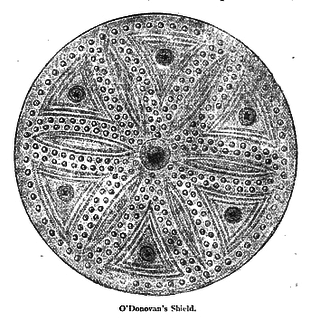| |||||
| Centuries: | |||||
|---|---|---|---|---|---|
| Decades: | |||||
| See also: | Other events of 1665 List of years in Ireland | ||||
Events from the year 1665 in Ireland.
| |||||
| Centuries: | |||||
|---|---|---|---|---|---|
| Decades: | |||||
| See also: | Other events of 1665 List of years in Ireland | ||||
Events from the year 1665 in Ireland.

The Lord Mayor of Dublin is the honorary title of the chairman of Dublin City Council which is the local government body for the city of Dublin, the capital of Ireland. The incumbent is councillor Alison Gilliland. The office holder is elected annually by the members of the Council.
Events from the year 1920 in Ireland.

The Eóganachta or Eoghanachta were an Irish dynasty centred on Cashel which dominated southern Ireland from the 6/7th to the 10th centuries, and following that, in a restricted form, the Kingdom of Desmond, and its offshoot Carbery, to the late 16th century. By tradition the dynasty was founded by Conall Corc but named after his ancestor Éogan, the firstborn son of the semi-mythological 3rd-century king Ailill Aulom. This dynastic clan-name, for it was never in any sense a 'surname,' should more accurately be restricted to those branches of the royal house which descended from Conall Corc, who established Cashel as his royal seat in the late 5th century.

Sir Donough MacCarty, 1st Earl of Clancarty (1594–1665), was an Irish magnate, soldier, and politician. He succeeded as 2nd Viscount Muskerry in 1641. He rebelled against the government, demanding religious freedom as a Catholic and defending the rights of the Gaelic nobility in the Irish Catholic Confederation. Later, he supported the King against his Parliamentarian enemies during the Cromwellian conquest of Ireland, a part of the Wars of the Three Kingdoms, also known as the British Civil War.

O'Sullivan is an Irish Gaelic clan based most prominently in what is today County Cork and County Kerry. The surname is associated with the southwestern part of Ireland, and was originally found in County Tipperary and Kerry before the Anglo-Norman invasion. It is the third most numerous surname in Ireland. Due to emigration, it is also common in Australia, North America, Britain, and the rest of the world.
The Second Desmond Rebellion (1579–1583) was the more widespread and bloody of the two Desmond Rebellions in Ireland launched by the Fitzmaurice/FitzGerald Dynasty of Desmond in Munster against English rule. The second rebellion began in July 1579 when James Fitzmaurice landed in Ireland with a force of Papal troops, triggering an insurrection across the south of Ireland on the part of the Desmond dynasty, their allies, and others who were dissatisfied for various reasons with English government of the country. The rebellion ended with the 1583 death of Gerald FitzGerald, 14th Earl of Desmond, and the defeat of the rebels.
Events from the year 1672 in Ireland.
Events from the year 1685 in Ireland.
Events from the year 1567 in Ireland.

Sir Daniel O'Brien, 1st Viscount Clare was an Irish politician and soldier. He was a younger son of Connor O'Brien, 3rd Earl of Thomond and Una O'Brien.

Justin McCarthy, Viscount Mountcashel, PC (Ire), was a Jacobite general in the Williamite War in Ireland and a personal friend of James II. He commanded Irish Army troops during the conflict, enjoying initial success when he seized Bandon in County Cork in 1689. However, he was defeated and captured at the Battle of Newtownbutler later in the same year. He escaped and was accused of having broken parole. After the end of the war, he led an Irish Brigade overseas for service in the French Army. He died in French exile.

Donal II O'Donovan, The O'Donovan of Clann Cathail, Lord of Clancahill, was the son of Ellen O'Leary, daughter of O'Leary of Carrignacurra, and Donal of the Skins, The O'Donovan of Clann Cathail. He is most commonly referred to as Donnell O'Donevane of Castledonovan in contemporary references of his time.

Owen MacCarthy Reagh (1520–1594) was the 16th Prince of Carbery from 1576 to 1593. He belonged to the MacCarthy Reagh dynasty. Owen was commonly referred to as "Sir" Owen MacCarthy (McCartie) in the English court records.

The Restoration of the monarchy began in 1660. The Commonwealth of England, Scotland and Ireland (1649–60) resulted from the Wars of the Three Kingdoms but collapsed in 1659. Politicians such as General Monck tried to ensure a peaceful transition of government from the "Commonwealth" republic back to monarchy. From 1 May 1660 the English, Scottish and Irish monarchies were all restored under King Charles II. The term Restoration may apply both to the actual event by which the monarchy was restored, and to the period immediately before and after the event.
The White Rod, White Wand, Rod of Inauguration, or Wand of Sovereignty, in the Irish language variously called the slat na ríghe and slat tighearnais, was the primary symbol of a Gaelic king or lord's legitimate authority and the principal prop used in his inauguration ceremony. First documented in the 12th century Life of Máedóc of Ferns, but assumed to have been used long before then, it is last documented in Ireland in the early 17th century. In Scotland the rod was used into the 13th century for the inauguration of its last Gaelic kings, and for the Norse-Gaelic Lords of the Isles into the 15th.
Sir John Davys was an Irish politician.

Callaghan MacCarty, 3rd Earl of Clancarty was the second son of Donough MacCarty, 1st Earl of Clancarty. Callaghan was destined for a Catholic religious career and entered a seminary or monastery in France where his family was in exile during Cromwell's rule. However, when his elder brother died in the Battle of Lowestoft, and the 2nd Earl, his nephew, died in infancy, he unexpectedly left his religious institution, returned to Ireland, became a Protestant, and assumed the title. On his deathbed he converted back to Catholicism.
Events from the year 1560 in Ireland.

Charles MacCarthy, 1st Viscount of Muskerry (1564–1641), also called Cormac Oge, opposed Strafford, Charles I's authoritarian chief governor of Ireland, and in 1641 contributed to Strafford's demise by travelling to Westminster to submit grievances.

Cormac MacDermot MacCarthy, 16th Lord of Muskerry (1564–1616) was an Irish magnate and soldier. He fought at the Siege of Kinsale during Tyrone's Rebellion.